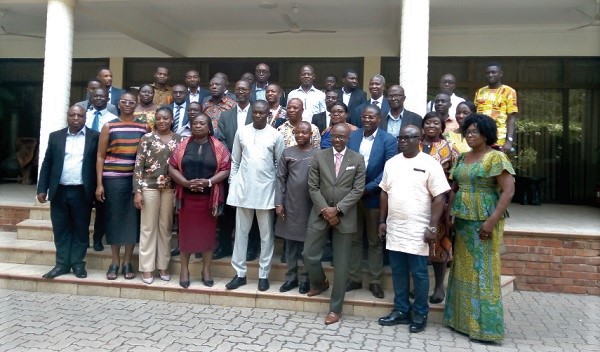
Broaden discussions on impact of Coronavirus on economy
A Deputy Minister of Finance, Mr Kwaku Agyemang Kwarteng, has said that Ghana ought to broaden the discussion to ensure that it is impacted minimally in the wake of the Coronavirus (COVID-19) epidemic, and not just limit it to the drop in crude oil prices.
“Generally as a country, what are the opportunities in this global epidemic and also what measures do we need to take to ensure that Ghana is impacted minimally,” he quizzed during an interview on the sidelines at the launch of the Ghana Extractive Industries Transparency Initiative (GHEITI) reports for mining and oil/gas sectors, 2017-2018, in Accra on March 11, 2020.
The outbreak of the Coronavirus has affected rising oil market and cast doubt on the size of world energy demand in the year ahead.
According to the Financial Times Stock Exchange, 250 groups analysis in January this year, it would require about £1.5 billion due to economic impact of the virus which had stalled growth in China and threatened production across the globe.
Consequently, oil prices have tumbled to a one year low of below US$50 from almost US$69 at the beginning of the year.
Declining oil prices
Mr Kwarteng noted that the declining oil price provided both opportunities and risk to Ghana’s economy- while the country made savings on the imports of crude oil, it would also impact negatively on government’s revenue from the export of crude oil.
Generally, he said, price volatility would harm both importers and exporters of oil as it got lower.
He cited the predictability of widening cost of production for companies and the uncertainty regarding their cash flows might induce companies to reduce their investments and limit job creation which could consequently harm economic growth in Ghana, and globally.
“In the face of price volatility and current challenges with respect to international commodity prices, government is working assiduously to ensure that the revenues from our extractive resources are prudently managed and utilised for the benefit of our people, especially those immediately and negatively impacted by the activities of the extractive sector activities,” he said.
Oil low impact on Ghana
Mr Kwarteng noted that the drop in oil prices would affect Ghana in two ways. Firstly, he said, it ought to reduce the prices of imported petroleum products.
“I am happy that the National Petroleum Authority (NPA) has already indicated that they expect it to go down by some 20 per cent,” he said.
On the export side, he said, it was going to hurt the fiscals because a certain projection had already been programmed in the budget.
Therefore, he said, “a downward variation in the price would mean we would have to make the necessary adjustment in the budget in order to contain the reduction.
That is what is immediately contemplative and that is what we are working at,” he said.
Mr Kwarteng said the Ministry of Health was working closely with the Ministry of Finance (MoF) to ensure that Ghana was able to contain the negative impact of the epidemic.
He said at the management unit, they were also looking at ways of dealing with some of the fiscal consequences relating to the management of government liabilities and also some of the benefits Ghana could get from the development in the international economy.
The reports
The EITI is an international initiative among governments, companies and civil society groups to promote transparency in the flow of revenues from extractive companies to host country governments based on a set of criteria for transparent reporting on the revenue stream and other benefits.
The purpose of the initiative is to encourage greater transparency in the extractive sector.
This would help citizens to make informed demands for the fair and sustainable use of revenues generated through the exploitation of natural resources.
The mining report showed that data from the Office of the Administrator of Stool Lands (OASL) indicated that the last transfer of mineral royalty receipts to communities impacted by mining was made from payments by mining companies in the period April to June 2014.
It said disbursement in 2017 was expected to commence with payments by mining companies in July 2014.
However, it was observed that the first payment in 2017 was made from payments made by mining companies between January and April 2017.
It recommended that the OASL and mining communities investigate the situation and ensure that any lost revenue was recovered.
The oil and gas report recommended that the Ghana National Petroleum Corporation (GNPC) cap 25 per cent of its total revenue which would further reduce its allocations to meet operational expenditure which should be critically looked at.
It said that had the potential to deny the National Oil Company (NOC) of the available resources to finance critical exploration activities and also had the effect of undermining the ability of the corporation to wean itself from allocation of petroleum revenue by 2026.